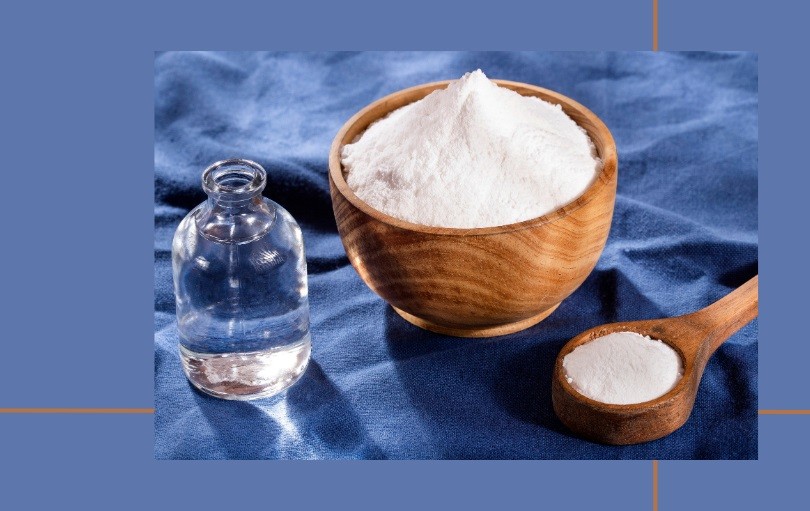Last Updated on November 27, 2025
Baking soda and vinegar do not dissolve hair. A mixture of these two products can help unclog a drain by loosening up hair and other debris.
Clogging of drains is a common issue in households and can be caused by various things, including hair buildup. While there are various products available in the market to unclog drains, many people prefer using natural remedies like baking soda and vinegar.
The process involves pouring baking soda into the drain, followed by vinegar, which causes a chemical reaction resulting in the production of carbon dioxide. This reaction can help loosen the hair and other debris, making it easier to flush away. It is important to note that this method may not work for severe clogs and professional plumbing services may be required.
Related: Why Does My Hair Dry So Fast?
Baking Soda And Vinegar: How They Work

The Chemical Composition And Reaction Between Baking Soda And Vinegar
Baking soda and vinegar are two household items that are widely utilized for their versatility. The combination of these two readily available items can be powerful at cleaning, removing stains, and dissolving hair clogs in the drain. Understanding the chemical composition between the two can help explain their effectiveness.
- Baking soda, also known as sodium bicarbonate, is a weak base composed of sodium ions (na+) and bicarbonate ions (hco3-).
- Vinegar, on the other hand, is an acid containing acetic acid in a concentration of about 5% to 8%, water, and other trace compounds such as flavorings.
- When baking soda and vinegar are combined, the mixture reacts chemically, resulting in carbon dioxide (co2) gas, water (h2o), and sodium acetate (nac2h3o2).
- The reaction between the two substances is an acid-base reaction, where the acetic acid from the vinegar reacts with the bicarbonate ions from the baking soda to form carbonic acid, which then rapidly decomposes to form carbon dioxide and water.
The Role Of Baking Soda And Vinegar In Dissolving Hair
Hair clogs in the drain can be a frustrating issue and can often be difficult to remove. Baking soda and vinegar mixture is one of the most effective methods to dissolve hair clogs.
- When baking soda and vinegar are mixed, they produce an effervescent reaction that generates heat and rapidly releases carbon dioxide gas.
- The bubbling and fizzing action generated by the mixture creates a physical force that can help loosen and break down hair clogs.
- The acidic nature of the vinegar helps to break down proteins in hair follicles, while the alkaline properties of baking soda help to dissolve and soften the clogs, making them easier to flush out.
Scientific Explanation Of How The Mixture Breaks Down Hair
The combination of baking soda and vinegar can be a powerful and natural alternative to harsh chemicals when it comes to dissolving hair clogs. The following explains how the mixture works to break down the hair.
- The hair clogs in the drain are largely composed of proteins, lipids, and minerals, all held together by keratin.
- The acetic acid present in vinegar acts as a solvent that dissolves the keratin in hair clogs and breaks down the proteins and lipids that make up the clogs.
- On the other hand, baking soda, which is alkaline, can weaken the sulfur bonds present in hair, further breaking down the hair clogs.
- Together, the mixing of baking soda and vinegar creates a chemical reaction that helps to break down the hair clogs in the drain more easily and swiftly compared to regular drain cleaners which often contain harsh chemicals.
A baking soda and vinegar mixture can be an effective and eco-friendly solution to dissolve hair clogs in the drain. The reaction between baking soda and vinegar creates carbon dioxide gas which can physically force the hair clogs out of the drain.
Furthermore, the acid-base reaction breaks down the proteins and lipids in hair clogs, making them easier to flush out. Try it yourself, the mixture is a simple and cost-effective solution to clear hair clogs from your drain.
Related: Why Does My Leg Hair Grow So Fast?
The Effectiveness Of Baking Soda And Vinegar On Hair

Does Baking Soda And Vinegar Dissolve Hair?
If you’ve been looking for natural remedies to boost your hair health, you must have come across baking soda and vinegar. Some people wonder if the two can dissolve hair. Let’s take a closer look at the effectiveness of baking soda and vinegar on hair.
Benefits Of Using Baking Soda And Vinegar On Hair
Baking soda is an excellent natural clarifying agent that can remove product buildup from your scalp and hair. On the other hand, vinegar contains acetic acid, which helps balance your hair’s ph levels, making it a natural conditioner.
- Baking soda and vinegar can help remove dirt, oil, and buildup from your hair.
- These ingredients can help de-tangle and condition your hair naturally.
- They can help restore your scalp’s natural ph levels, which are crucial for healthy hair growth.
- Using baking soda and vinegar can be cost-effective since you don’t need to spend much money on fancy hair care products.
Potential Side Effects Of Using Baking Soda And Vinegar On Hair
While baking soda and vinegar are natural products, they may not be suitable for everyone.
- Baking soda can be too harsh and strip your hair of its natural oils, leading to dryness and breakage.
- When used excessively, vinegar could cause scalp irritation due to its acidic nature.
- If you have dyed or color-treated hair, using baking soda and vinegar may cause it to fade or become too brassy.
Dos And Don’Ts When Using Baking Soda And Vinegar On Hair
If you’re interested in using baking soda and vinegar on your hair, here are some dos and don’ts to consider:
Dos:
- Do dilute baking soda in water before applying it to your hair to avoid dryness and breakage.
- Do mix vinegar with water before using it as a rinse to prevent scalp irritation.
- Do follow up with a deep conditioning treatment after using baking soda and vinegar on your hair.
Don’ts:
- Don’t use baking soda and vinegar on your hair too frequently, as this may be damaging to your hair’s health.
- Don’t forget to rinse your hair thoroughly after using baking soda and vinegar to avoid any leftover residue.
Baking soda and vinegar can be an excellent addition to your hair care regimen, but they should be used with caution and always follow the dos and don’ts mentioned above. With proper care and use, you can enjoy healthy, luscious hair without breaking the bank.
Alternative Methods Of Dissolving Hair
Hair removal can be a vexing process for many people. Instead of using conventional methods of waxing or shaving, some prefer natural remedies and alternative chemical options. Here are some alternative methods for dissolving hair.
Other Chemical Options Available
In addition to baking soda and vinegar, other chemicals can help dissolve hair.
- Sulfuric acid: A potent acid that can melt hair and skin. This chemical is highly dangerous and should only be used by professionals.
- Caustic soda: Lye or sodium hydroxide, can dissolve hair, but it can also cause severe burns.
- Sodium or calcium thioglycolate: These ingredients are found in depilatory creams and lotions. They break down hair bonds, making the removal of hair easier.
Home Remedies Besides Baking Soda And Vinegar
Baking soda and vinegar might not be everyone’s cup of tea.
- Sugar paste: A thick mixture of sugar, lemon, and water that can be heated to create a paste. When applied to hair, the paste sticks to hair fibers and pulls them out when removed.
- Lemon and honey: A combination of honey, lemon, and sugar is a natural alternative to waxing. It is less painful and can be used on sensitive skin.
- Gelatin: A sticky mixture made from gelatin and milk that can grab onto hair, making it easier to remove.
Conventional Methods Of Hair Removal Versus Natural Methods
Conventional methods of hair removal, such as waxing and shaving, can be expensive and painful. Natural methods can be a good alternative, but they might not be as effective.
- Waxing: Waxing pulls hair out from the roots, which takes some time for the hair to grow back. It can be painful and cause ingrown hairs.
- Shaving: Shaving is cheap and can be done at home. Hair grows back quickly and can cause cuts and razor bumps.
- Natural methods: Natural methods can be used at home and can be less painful. They might not provide long-lasting results compared to conventional methods.
There are alternative methods for dissolving hair. Whether you prefer natural remedies or alternative chemicals, it is essential to choose a method that works best for you. Always be aware of the risks and dangers associated with the method you choose.
Related: How To Grow African American Hair Fast?
Frequently Asked Questions On Does Baking Soda And Vinegar Dissolve Hair?
What Happens When You Mix Baking Soda And Vinegar?
When mixed, baking soda and vinegar create a fizzing reaction that can be used for unclogging hair in drains.
Can Baking Soda And Vinegar Dissolve Hair?
When used together, baking soda and vinegar can be effective at dissolving hair in drains, but they may not work for all types of clogs.
How Long Does It Take For Baking Soda And Vinegar To Dissolve Hair?
The amount of time it takes for baking soda and vinegar to dissolve hair will depend on the severity of the clog and the amount of product used.
What Are Other Ways To Unclog A Drain Apart From Baking Soda And Vinegar?
Other ways to unclog a drain include using a plunger, or a drain snake or calling a plumber to resolve the issue professionally.
Is It Safe To Use Baking Soda And Vinegar To Unclog Drains?
Using baking soda and vinegar to unclog drains is generally safe, but it may not work for severe clogs. It is important to avoid mixing vinegar with other cleaning products as this can produce harmful gases.
Conclusion
Using baking soda and vinegar as a DIY solution for dissolving hair in your drains can be effective, but results may vary. It is important to note that baking soda and vinegar do not have the power of commercial drain cleaners and may not work on severe clogs.
Additionally, using too much baking soda and vinegar together can create a dangerous chemical reaction. It is always best to use caution when attempting to clean your drains and consider seeking professional assistance for stubborn clogs. Lastly, proactive maintenance, such as regular cleaning and hair removal, can prevent clogged drains in the first place.
Overall, baking soda and vinegar can be a helpful tools in maintaining your drains, but it is important to use them carefully and thoughtfully.

